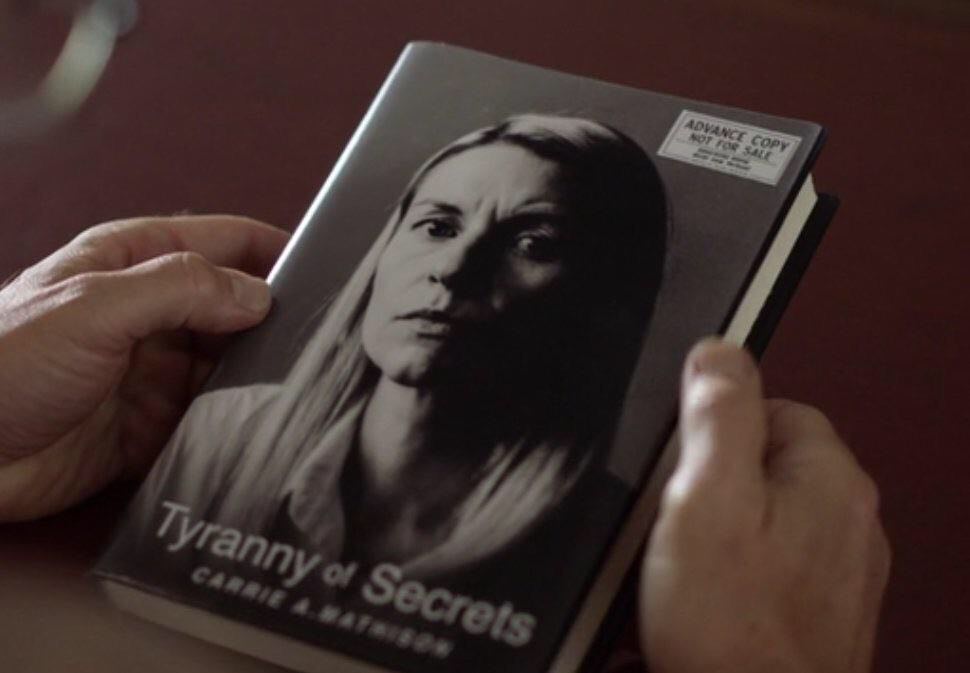
***SPOILERS*** This is a review of a well-earned series finale, so if I even have to say it, please watch the entire series before proceeding. It has one of my favorite first seasons of this past decade. Carrie & Brody, man. Episode 7: “The Weekend” is all I have to say about that. And, if you’re feeling frisky, interpolate the 19 episodes of My So Called Life with the first two seasons as a possibly imagined flashback. But what follows is about the very very last episode of the series. And I don’t want to ruin it for anyone. So. Watch Homeland.
It’s important to keep in mind that this narrative is a composition. From all the free jazz improvisation — remember from Season One, Carrie Mathison’s (Claire Danes) favorite album is “Monk’s Dream” — all the way to Kamasi Washington showing up in the epilogue, it’s easy to feel like the writers, and Carrie, are making this up as they go along. That we open with Nicholas Brody’s (Damian Lewis) confession tape he recorded before almost suicide-bombing the vice-president just as a weak attempt at bookending the series…

Before the finale aired, I was definitely wondering if he or poor Franny (Claire & McKenna Keane) was even going to rate a mention, so it was very cool to open with that tape, hearkening all the way back to the first season finale in 2012. Carrie is driving to Saul Berenson’s (Mandy Patinkin) and remembering Brody’s confession before he went to suicide-bomb the vice-president, which was thematically cool, but I couldn’t decide what narrative purpose it was serving besides reminding us that this was the love of her life/father of her child/she probably still thinks about him every day, that sort of thing. Let’s look at the content of what he said eight years ago:
“By the time you watch this, you will have read a lot of things about me. About what I have done. That’s why I wanted to explain myself. So that you’ll know the truth.”
She remembers these words, then we head on into the finale action and it doesn’t seem like it ever connects up with the present-day action. And it doesn’t until the epilogue reveal. But first, a few words about how we get there.
I was definitely concerned a couple of times that this thing was going to run off the rails here in the final minutes. I mean, they did a great job of writing themselves into a corner with the final cliffhanger to “Kill Saul,” but it left a ridiculous amount of heavy lifting to be able to satisfactorily resolve that ultimate escalation and betrayal.
The issue is that the Russians won’t turn over the flight-recorder from the president’s crashed helicopter, which is the only thing that will deescalate the standoff between America and Pakistan on the Pakistani border, unless Carrie provides the name of Saul’s high-level deep-cover Russian asset. But he won’t give it up because, outside of his long-standing loyalty to her, it will take ten years to position someone else to do that much good.

So, Carrie’s only alternative is to kill him because that will initiate a transfer of the asset to his most trusted ally, who is still Carrie until he finds out about all of this. And to the writers’ and actors’ credit, I fully believed that she was going to actually go through with killing him right up until she backed off; I was watching with as much engagement as you might a car-crash that’s just about to happen in slow-motion. I knew it would be a horrible mistake but didn’t think they were going to be able to swerve away.
Yet, swerve they did. They probably could have reestablished the thread with Saul’s sister a bit earlier than when it was time to pay it off, as we hadn’t seen her in a couple of seasons, but it didn’t ring false, and that was certainly a shrewd move on Carrie’s part, anticipating how the asset-handler switch would have happened and just initiating the handover without actually having to execute her mentor.

And so she won. She saved America from nuclear war with Pakistan, but at the cost of her reputation and country and relationships with everyone she knows and loves except the Russian spy who put her in this situation in the first place. Then, we flash to Two Years Later, and our girl seems happy and well-adjusted in Moscow. She’s got a killer pad with Yevgeny (Costa Ronin) and it’s time to go catch some American jazz with more than a passing nod to Sun Ra in a superior venue. I worry that this might be too much of a tonal shift for folks who didn’t play the hell out of Monk’s Dream in 2012 just because she name-checked it.
But it works. She’s safe in her new life. At the same time, we see that Saul is moving out of his place after recovering from a heart attack. He receives a package that turns out to be an Advance Reading Copy of his protégé’s tell-all memoir…

Her pensive face on the cover speaks volumes, everything she’s had to give up in order to protect it. But there’s one final twist. Saul checks the spine for a message, which was his method of communication with his former Russian asset, and sure enough, Carrie has sent him a message stating that she’s now in position to provide deep-cover intel on Russian activity to make up for the lost asset. So, she’s sacrificed everything but now balanced out her betrayal. And now the Brody parallel sharpens into focus. He betrayed his country as well, just like everyone thinks she did, and so those lines from his suicide-tape “That’s why I wanted to explain myself. So that you’ll know the truth,” seem to reflect upon this expatriate memoir, but even that’s a trick.
The real explanation is only for Saul and the viewer. She was never going to kill Saul, but her plan if he didn’t break was always to replace the asset that she had to burn to avert nuclear war. So, even if only Saul is the one who knows the truth, Carrie succeeds where Brody failed. She survives to redeem her betrayal of her country, and her story will keep on going, clandestine hand-offs in the ladies’ room while convincing her Russian handler that he’s still in charge. It’s a wonderful and well-balanced ending to a story that seemed like it was going to absolutely crash and burn right at the very end.
This show was one thing for the first three seasons, and then it had to change and took a couple of years to find itself again. Seasons 4 and 5 weren’t bad television, but there was a necessary realignment after the dynamic-shift.
But just like its protagonist, this series stuck the landing by remembering where it began and succeeding where it at first failed — with one American’s betrayal that only serves as cover for the fact that she is still actively working, even from the other side of the world, to protect her homeland. 4.5/5 Bibles.
-Rob Bass

